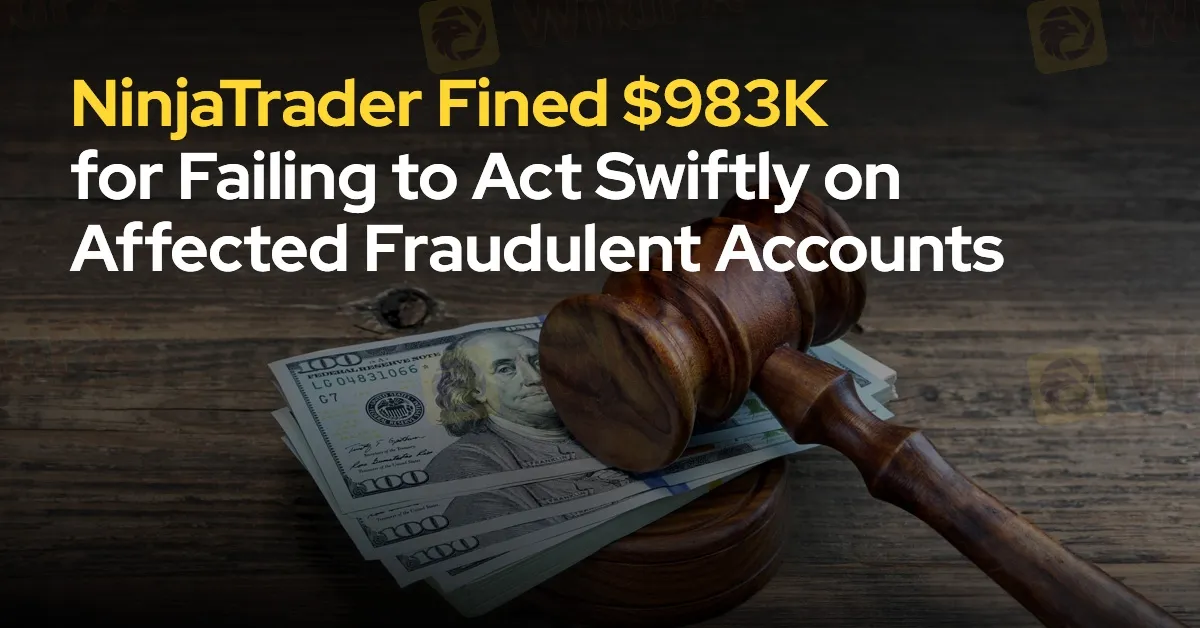简体中文
繁體中文
English
Pусский
日本語
ภาษาไทย
Tiếng Việt
Bahasa Indonesia
Español
हिन्दी
Filippiiniläinen
Français
Deutsch
Português
Türkçe
한국어
العربية
NinjaTrader Fined $983K for Failing to Act Swiftly on Affected Fraudulent Accounts
Abstract:The Commodity Futures Trading Commission (CFTC) has penalized NinjaTrader Clearing, LLC (NTC) with a fine of $983,425 for failing to adequately supervise its employees in handling accounts tied to fraudulent activities.

The Commodity Futures Trading Commission (CFTC) has penalized NinjaTrader Clearing, LLC (NTC) with a fine of $983,425 for failing to adequately supervise its employees in handling accounts tied to fraudulent activities. The Illinois-based futures commission merchant was found to have neglected its responsibility to oversee these accounts, which were flagged due to suspicion of fraud.
According to the CFTC, NinjaTrader did not act swiftly when it was ordered by a statutory restraining order (SRO) to freeze or restrict the affected accounts. The company's delay in taking action allowed the accounts to continue trading, resulting in additional losses exceeding $200,000 from open positions, further aggravating the financial damage linked to the fraudulent operations.

The regulator cited the lack of proper internal controls and emergency response procedures as a major factor in the failure. Beginning in late 2020, NinjaTrader reportedly did not put in place effective measures to manage court orders involving flagged accounts. Even after receiving the SRO in January 2022, the firm allowed the suspect accounts to remain active, contributing to ongoing financial losses.
As part of the settlement, NTC agreed to pay a civil fine of $750,000 and an additional $233,425 in restitution. This restitution will be allocated to victims who were affected by the fraudulent activities connected to the case.
This enforcement follows a similar regulatory action by the CFTC, which recently fined Nasdaq Futures $22 million for violations tied to its incentive programs. Nasdaq Futures, a former designated contract market (DCM) that operated between July 2015 and July 2018, offered an incentive program called the DMM (Designated Market Maker) program.
Although the firm disclosed a fixed stipend for market makers, the CFTC found that it failed to properly disclose a volume-based payment structure that rewarded certain users, thereby violating regulations. Additionally, the regulator noted that Nasdaq Futures provided inaccurate information during its inquiries into the matter.
These recent penalties reflect the CFTC's ongoing efforts to enforce compliance in the commodities and futures markets. By holding firms accountable for lapses in oversight and transparency, the regulator aims to maintain the integrity of the financial system and protect investors from harmful practices.
Market participants are urged to remain compliant and ensure that their operational procedures align with regulatory standards to avoid similar enforcement actions in the future.

Disclaimer:
The views in this article only represent the author's personal views, and do not constitute investment advice on this platform. This platform does not guarantee the accuracy, completeness and timeliness of the information in the article, and will not be liable for any loss caused by the use of or reliance on the information in the article.
Read more

The Funded Trader: Reactivates Accounts with Revised Payout Structure
Proprietary trading firm The Funded Trader has detailed its financial recovery efforts following a turbulent period marked by an unsustainable payout model. Addressing these challenges publicly, the firm outlined the steps being taken to resolve outstanding obligations and ensure operational sustainability.

Doo Group Broadens Global Footprint with Indonesian Broker Acquisition
Doo Group has announced its acquisition of PT Prima Tangguharta Futures, a Jakarta-based broker specialising in online derivatives trading. This move represents a significant step in Doo Group's regional expansion strategy and reinforces its growing presence in Southeast Asia.

Google Warns of New Deepfake Scams and Crypto Fraud
Google exposes deepfake scams, crypto fraud, and app cloning trends. Learn how to spot these threats and safeguard your data with expert tips and advice.

Why Is UK Inflation Rising Again Despite Recent Lows?
October inflation rises to 2.3%, driven by energy costs. Renters face 8% annual hikes, while house price inflation climbs. Interest rates stay elevated.
WikiFX Broker
Latest News
WikiEXPO Global Expert Interview: The Future of Financial Regulation and Compliance
DFSA Warns of Fake Loan Approval Scam Using Its Logo
Consob Sounds Alarm: WhatsApp & Telegram Users Vulnerable to Investment Scams
CySEC Revokes UFX Broker Licence as Reliantco Halts Global Operations
GCash, Government to Launch GBonds for Easy Investments
eToro Expands Nationwide Access with New York Launch
Webull Partners with Coinbase to Offer Crypto Futures
Why Is UK Inflation Rising Again Despite Recent Lows?
Interactive Brokers Launches Tax-Friendly PEA Accounts in France
Find Regulated Brokers from A to Z on WikiFX
Currency Calculator


